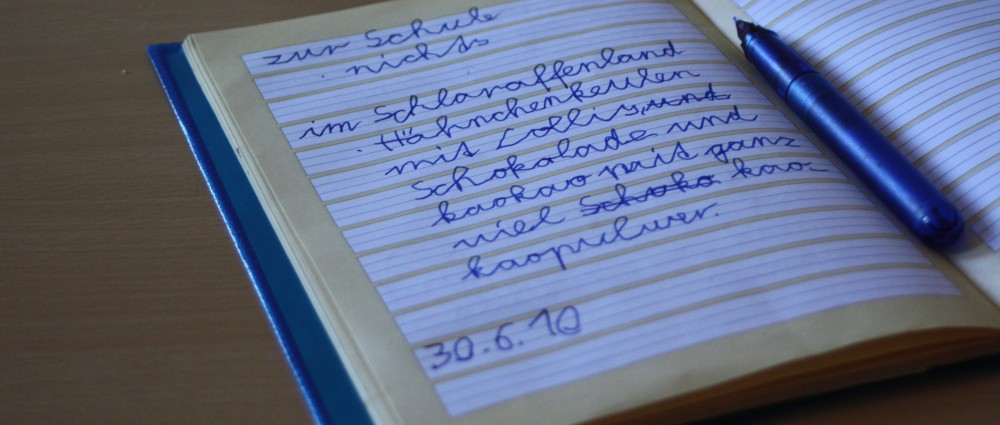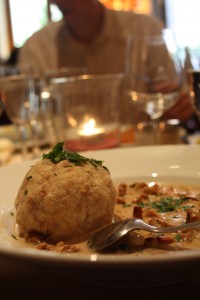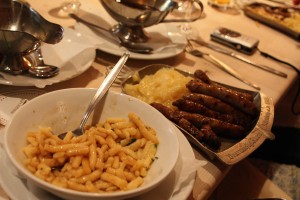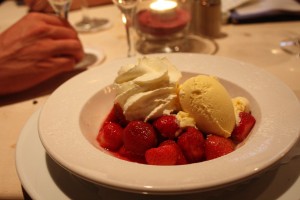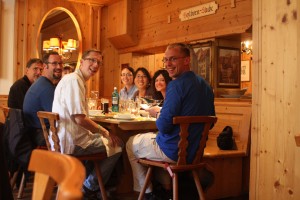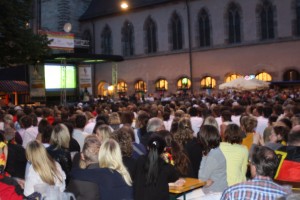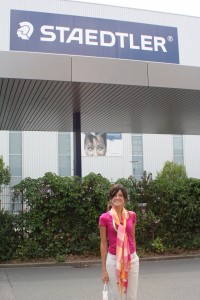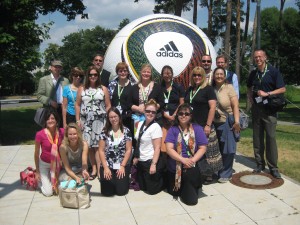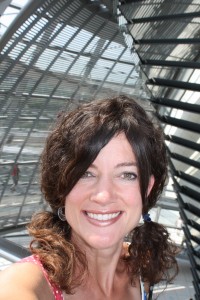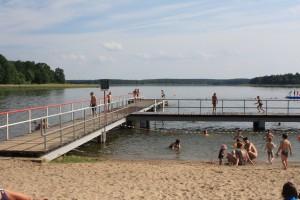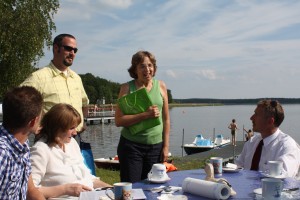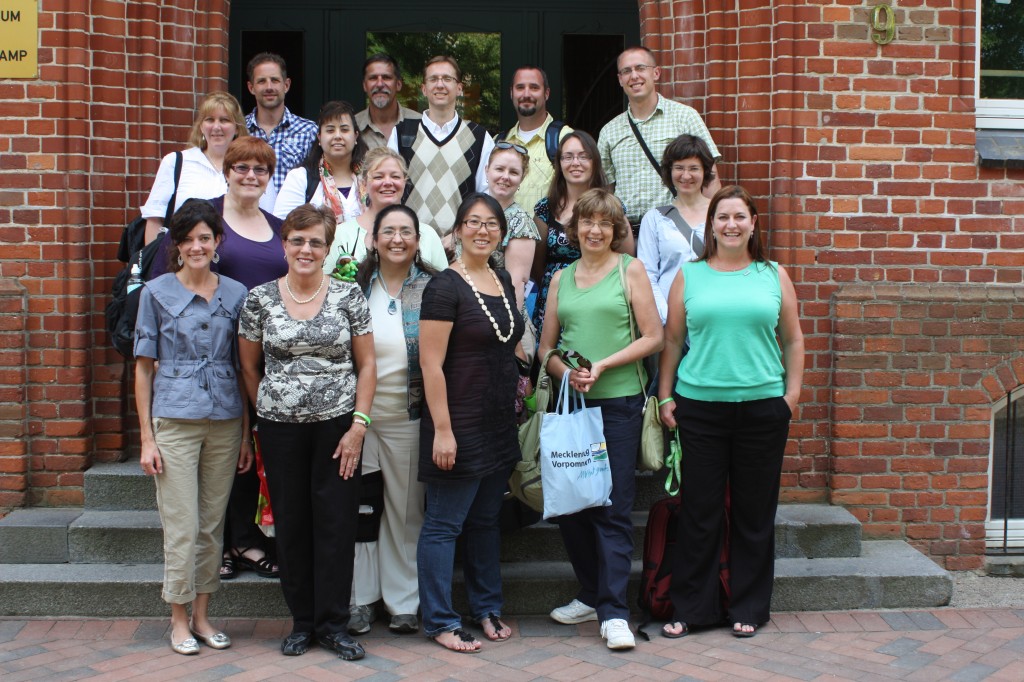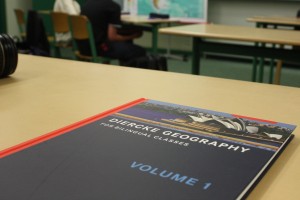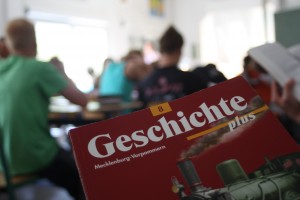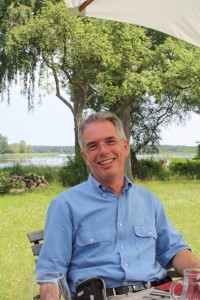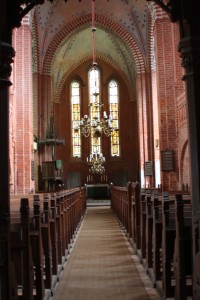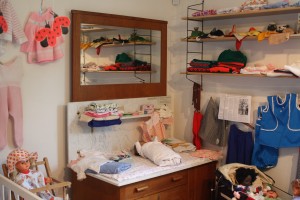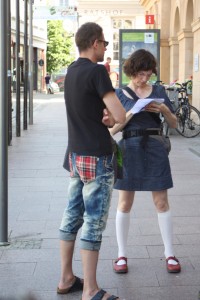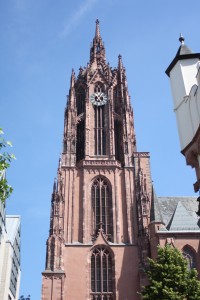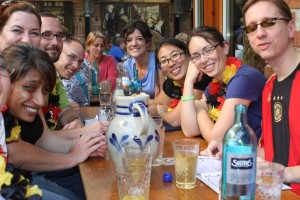This trip to Germany has been informative, thought-provoking, unpredictable, and even entertaining! Our journey that started in Frankfurt, has provided us with a taste of the more quaint and rural areas as well as the energy and fast-paced lifestyle of the big city (Berlin). Our experience in Germany has been enriched by the fantastic guides that have accompanied us along the way! We just said goodbye to Gerrit and Monica, who we met on the train to Schwerin and who stayed with us through our stay in Berlin. Right now we are on a train to Nuremberg, so I have some time to reflect on the Modern Germany lecture we heard yesterday by Mr. Daniel Szabo de Bucs. His concise interpretation of what modern Germany really is, shed light not only the on the history of Germany but also the challenges they face today and its goals for the future. It is probably my favorite lecture of this study tour so far, because this guy had so much personality. His degree is in comparitive studies of religion, which he said is more of a sociology or anthropology degree, and China studies. His wife has always lived in Germany, but her parents are Asian, and his grandfather came from Hungary after World War 1. So, when asked by the Goethe Institut to present Modern Germany, Mr. Szabo de Bucs thought, “I should talk about this country! It is fitting!” I’m going to try an summarize the process the presenter went through to answer the question “What is Modern Germany?”
First, he went to his dad, who snuck out of the German army because he was Hungarian. His dad spent his time of the war NOT being a soldier. “That’s why I’m here, ” Mr. Szabo de Bucs deduced.
“Modern Germany started in 1945 with the downfall of the German Reicht!’ answered Mr. Szabo’s father. However, he wasn’t satisfied with this answer because he reflected on the starvation, fear, and black market that was present during this time period. “There was a wave of guilt that came over, and the people came back totally destroyed. So, I looked at these facts and asked others.”
Another person decided that Modern Germany began in 1949 with the establishment of the German Democratic Republic (East Germany). “I have a very good reason to choose another date,” Mr. Szabo de Bucs reasoned. “This doesn’t feel modern to me.”
Then, there was 1967-1968 when the “student revolution” took place. He said that Germany psychologically and socially changed. This movement has a different connotation than in other places, though. For the first time, students learned about the political and social upheaval that their parents and grandparents caused. They went home and asked their parents, and the answer they got was silence. They fought against “every symbol” in Germany. After the war, Nazis were still everywhere; they went back to their homes. This realization in the minds of students changed the country. This “hippie movement” happened in GDR, but not to the same extent; it wasn’t as political.
1989. This was the first time that political members had no memory of the third reicht. Reunification made the in situation in Germany far more complex. So, Mr. Szabo reflected back on GDR times. “I will paint a black and white picture, but of course there will be many shades of gray.” Everything was driven by idealogy. Both East and West Germany wanted to make it different and make it better, but politically the contrast was strong. West Germany introduced a parliamentary system. The East immediately abolished the federal administration. There were good intentions on both sides.
After the war, it became harder and harder to travel between the East and West. In 1961, GDR protected the border between the two Germanys. “I remember my parents talking secretly while putting packages together to send to my relatives in the East…should we put the chocolate in? No, we shouldn’t put the chocolate in because they will be able to smell it, etc.” It was difficult to maintain family relations between the two Germanys. For the West, the GDR was something “weird..strange…unmarked space somewhere behind this iron curtain.” Mr. Szabo de Bucs described this as something very strange and “not very German.” There were only three ways you could get into West Berlin: fly, train, or car. Transit highways were maintained by West Germany money. He described the checkpoint between the two: “It was a crazy checkpoint. You had to wake for an hour and hand in your passport. They would take your passport and then it would go away from you on this little conveyer belt.” Then, they would check the time you spent. If you took too long, they would be suspicious. If you didn’t take long enough, they would fine you for speeding. “It didn’t belong to me.” This produced a different “software” in the heads of the people. It led to meager economic success in East Germany. Time and money was disconnected in the heads of people. Later, this made it very hard for people to succeed under capitalism (after re-unification). There was almost no immigration to the GDR, so it was very homogeneous, whereas in the West, there was a lot of immigration.
After reunification, Germans still felt a sense of guilt. They wanted to learn about what took place. “Let’s face it..let’s memorialize it.” This led to anti-patriotism.
“In November of 1989, the wall crumbled before our eyes. Nobody expected it. We all knew in West Germany that there were riots, but it was a complete surprise…I was living in West Berlin in 1989 in my first apartment (near one of the checkpoints). I was sitting at home reading a book. I could feel that there was something going on..I could hear the roar of the people.” “Wahnsinn,” he described it in German. “This mixture of crazy, what is going on?” He said that shops were open and were handing out champagne. People were staying in tents because they were afraid they might close the checkpoints again. Public transportation broke down, so it took him two hours to walk home that night. He struggled to explain how euphoric he felt that night.
“What Now? Why should Germany reunify and how? People in East Germany were deprived for decades of the simple comforts in life. Half a million moved over from East Germany to West Germany. Who went? The young, the fast, the able. The decision to merge the two countries immediately was pure necessity.
1990-reunification. “We had one Germany. 11 months after the wall went down the GDR was absolved. It took both sides a while to realize that unification meant the disappearance of the GDR.” Then, Mr. Szabo de Bucs explained some of the challenges the the fall of the wall created. “If you close down industry in East Germany, what do you do with the people?” Unemployment prior to the fall of the Berlin wall was non-existent. It shot from 0-90%. “Next to the reconstruction of the East, there was the de-construction of the East.” For example, “there were a huge number of people protecting the border, and now you have no border.” Then, Mr. Szabo de Bucs asked, “what do you do with history and political science teachers?” Committees were set up and teachers had to be re-evaulated.
“Cold sobriety set in. East Germans realized if they couldn’t shape up, they would be losers.” Mr. Szabo said that resentment grew. West Germans were dismissed as arrogant, know-it-alls. East Germans would talk about the old days. “We want our wall back.” He said that the biggest mistakes were wrong assumptions and false promises. West Germans misinterpreted the GDR thinking they were just like them, minus the wealth. Both sides were victims of propoganda. East Germans made wrong assumptions about capitalism. He said there were actually some positive facets of the GDR. For example, that had in place an effective early age child care system. Women could work and have kids. The birthrate was much higher in East Germany, but after the wall fall, the birthrate dramatically dropped to 0.8 children. A society needs 2.1 to sustain population.
Mr. Szabo de Bucs continued to talk about challenges that a unified Germany faces. Rather than expound on these, I will list them here just to make this shorter.
Challenge of Democracy
Challenge of Modern Family
Challenge of Integration
Challenge of Fair Distribution of Wealth
Challenge of the Global Standing
I could elaborate on the details of these challenges but to make this shorter, I will close with where Germany stands today. Germany has the biggest economy in Europe, and is second to China as the world’s biggest exporter. I think the most surprising thing I have experienced here in Germany is the lack of patriotism due to a sense of guilt of the past. Mr. Szabo de Bucs said that he has never been able to sing the national anthem or wave a German flag. The exciting thing about being here for the World Cup, is that this is the only time Germans feel like they can really express their patriotism for their country. This makes me even more thankful that I have been able to be here during such an imporant sporting event for Europeans and for the world. He said that he hopes for his sons that he will one day be able to show patriotism.
I had the opportunity to present a gift from Arkansas to Mr. Svabo de Bucs. I gave him a book of photographs from Tim Ernst, whose photos represent various landscapes in Arkansas and a bluegrass CD from a local Fayetteville band. Here are some pics!
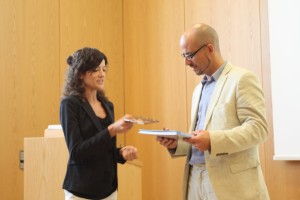
Daniel Svabo de Bucs, Goethe Institut, Berlin
